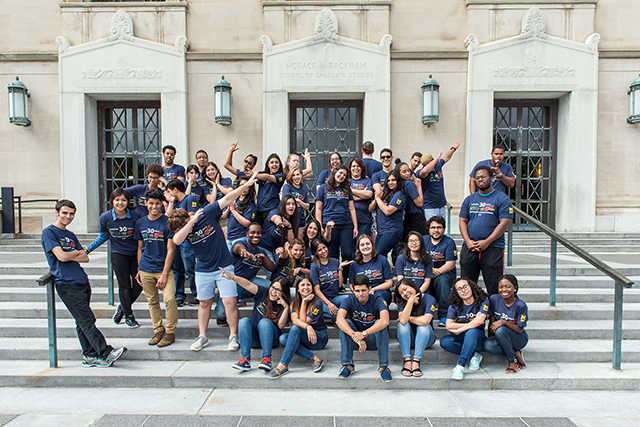
2016 SROP participants on the front steps of Rackham.
This summer marks the 30th anniversary of the Summer Research Opportunity Program (SROP), one of the University of Michigan’s most dynamic recruitment efforts intended to prepare students from underrepresented backgrounds to pursue Ph.D.s in the biological, physical sciences, engineering and social sciences. The program also included humanities students and departments until 2015, when MICHHERS was created as a separate program for this area.
During the annual 8 week program, 30-40 undergraduates from around the U.S. and Puerto Rico reside on campus while they conduct research alongside U-M researchers. Besides free room and board, they receive a $4,000 stipend, professional development classes, GRE training, and a fee waiver if they choose to apply to a Rackham doctoral program. Participants’ days are intensive as SROP’s comprehensive approach to preparing them for rigorous graduate study involves providing feedback on application materials, supporting networking efforts, and offering mentoring, all along active participation in ongoing research projects.
Programs like SROP that uphold U-M’s commitment to diversity, equity, and inclusion ensure that aspiring researchers can have access to a wide-ranging community of intellectuals who share their passion for knowledge and a wide-reaching support network as they pursue success in higher education, often as some of the few with their backgrounds in their fields.
SROP has a high success rate in its mission to prepare outstanding undergraduates for Ph.D. programs, with 66% of participants going on to attend graduate school. This percentage does not include participants who go on to pursue other doctoral degrees such as in medicine or law.
“SROP is an exemplary partnership within the Big Ten Academic Alliance because it has opened the door of access to the Ph.D. at all of our institutions,” says Mark Kamimura-Jimenez, Director of Graduate Student Success at Rackham. “At U-M, SROP has produced some of our most talented researchers, leaders and contributors to their disciplines and the academy.”
A Shared Commitment to Graduate Education
SROP works closely with faculty in U-M’s schools and colleges to ensure mutual benefit for the participants and the graduate programs across campus. Each year applicants in this competitive process select from a project list that details the names of Principal Investigators and research projects to which they will be able to contribute.
Ioulia Kovelman, Assistant Professor of Psychology at U-M, works with SROP students every year. “Each year a brilliant student joins our laboratory through the SROP program. These bright young minds work hard, enrich our science, and, best of all,” she says, “many of them come back to join our laboratories as some of the top graduate students in our program.”
Nils Walter, Professor of Chemistry and of Biophysics at U-M, explains Chemistry’s growing involvement with SROP, “From 2012 on, not only did every faculty become part of the SROP research project list, but many Chemistry faculty newly began hosting SROP students. Some of these students are now graduate students at Michigan, illustrating the great impact SROP has had on our department, particularly over the last few years.”
Hands-on research and regular interaction with faculty are key components to helping participants make informed decisions about pursuing graduate studies. “SROP helped me to solidify my commitment to a research career,” says Rackham student Jaime Muñoz Velázquez, who was a participant in 2013 and is now in the Ph.D. program in Developmental Psychology at U-M. “I was immersed into the life of a ‘researching graduate student’ before I became one.”
For Muñoz Velázquez, that meant being allowed “to get involved with novel and exciting research projects through intensive data collection in Psychology. I also received great research mentoring from my SROP Principal Investigator and a wonderful letter of recommendation when applying to graduate schools.” Muñoz Velázquez now uses neuroimaging methodologies he learned while in SROP to study creativity in twins.
“It’s a family”
SROP’s coordinator and Rackham Academic Program Officer for Recruitment and Partnerships Gisselle Vélez-Ruiz has been working with the program for 5 years. She has made marked advances for the program, including more one-on-one opportunities for the students to meet with current graduate students and alumni of the program to help them produce successful graduate school applications. Additional community building activities have allowed the SROP researchers to connect with students participating in other campus research programs.
One of the most noteworthy measures of success is the devotion of SROP alumni. “Students come to SROP to connect with others, and alums are always excited to come back and help lend a hand,” says Vélez-Ruiz, who herself is an SROP alum and who went on to receive her Ph.D. in Cellular and Molecular Biology at U-M.
Another SROP alum from 2014, LaVelle Ridley, attended the program when SROP included students in the humanities. As a current Rackham Ph.D. student in English and Women's Studies, he plans to give back to the program that gave so much to him: “I hope to do some future volunteering with the program and hopefully even serve as a summer grad student leader,” says Ridley. He describes how the graduate student leaders that year, LaShonda Brenson and Estefania López, were such important resources for him: “From giving me feedback on my CV, research poster and statement of purpose, to giving tips on how to get into grad school and make the most of it, they were such an influential part of my SROP experience that I hope to give that to other undergraduates coming into the program.”

Students walk through the tunnel to the field on a tour of the Big House during SROP orientation. Photo by Ying Xie.
Reflecting on her own journey, Vélez-Ruiz says, “This program was instrumental in my own path to graduate school. It gave me the resources and connections that helped me not only to apply, but to successfully complete my Ph.D. To me it’s instrumental to help others succeed, especially those from underserved and underrepresented backgrounds. SROP is more than a program–it’s a family.”
U-M’s SROP will celebrate its 30 years of accomplishments in stride with its regular summer program, with anniversary programming featuring invited alumni. Students will be presenting their work in a research symposium open to the public on Thursday, July 28th from 9:00am -12:30pm in the Rackham Building.
